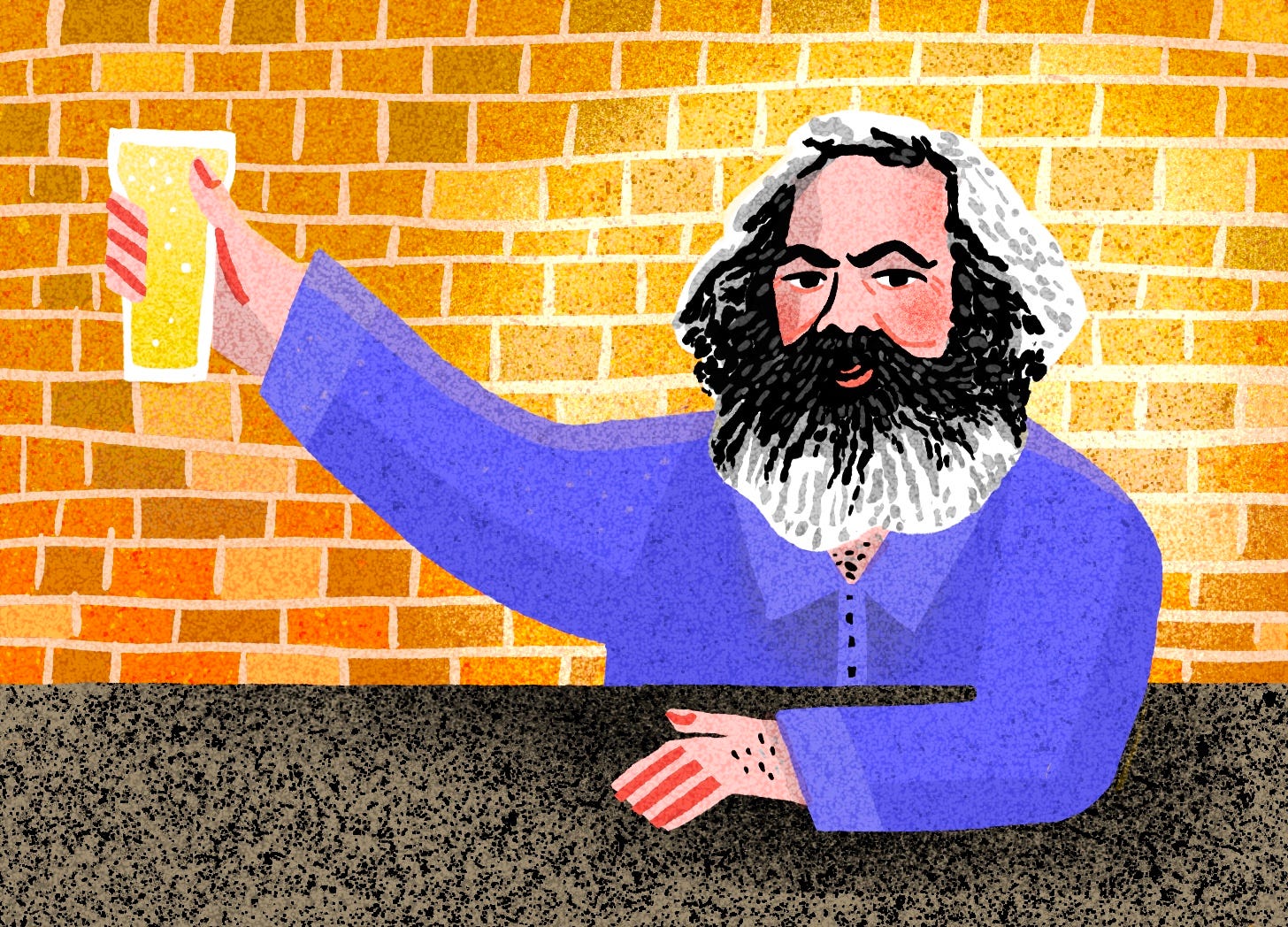Marx and Alienation: A Simple and Powerful Idea
Excellent article rédigé le 31 octobre 2025 par Kevin Thomas sur l'aliénation au sens marxiste du mot sur Substack
Marx and Alienation: A Simple and Powerful Idea
Marx’s Concept of Alienation
Oct 31, 2025
[artwork by Sandi Falconer]
Anyone who has spent time with me has probably heard me say that once you start reading Marx, you start seeing his ideas everywhere. I think this observation is largely due to his materialist and dialectical approach and his anticipation of so much of modern life. Regardless of why, the result is that once you really start reading Marx, it is hard not to notice how intuitive most of his arguments actually are.
Beer and Freedom is a reader-supported publication. To receive new posts and support my work, consider becoming a free or paid subscriber.
Subscribe
I think one way to get more people to read Marx is to show how this intuitiveness can lead to an accessibility which, considering the complaints against his often-argumentative style and dense prose, isn’t often associated with him. Therefore, I’m starting this series to explore some of Marx’s core concepts to reveal, without stripping away too much, how simple and powerful his ideas can be.
Since my book club is currently doing a deep dive on Marx’s concept of Alienation (or estrangement), I’m going to take advantage of the timing and, for my first piece in this series, focus on it.
This might be a boring series for anyone who already knows Marx’s work well, so I won’t be offended if you don’t stick around, but if you do and you notice I have misunderstood something (or explained it poorly), I invite you to point it out in the comments. My hope is we all, myself included, walk away with a better understanding of Marx.
The Transition to Material Alienation
Marx’s concept of alienation is a crucial idea that bridges his early philosophical work with his mature critique of political economy. The development of this concept emerged, for Marx, as a necessary way to think about the limitations of purely political and religious movements for freedom.
In his early works, Marx utilized a technique of inversion (adopted from Ludwig Feuerbach) to argue that humanity is alienated by its own creations, specifically through two core critiques.
First is Political Alienation: Stemming from his work in the Critique of Hegel’s Philosophy of Right, Marx critiqued the state as an abstract power that stands above and apart from the daily lives of people. Political freedom alone is inadequate because it leaves civil society (private life) dominated by intense competition and the conflict of self-serving interests.
Second is Religious Alienation: Marx famously termed religion the “opium of the people,” serving as the “illusory Sun” around which humanity revolves. The religious critique provided the template for his economic analysis: just as people create a distant, dominating god, social labour creates an independent, dominating material power.
This analysis moved Marx from abstract ideas to the material organization of society. The ultimate source of human alienation, Marx concluded, was no longer religion, but the economy. He saw money as the new, dominant idol of society, a power created by humanity but now independently dominating its creators. It was this realization, that the source of alienation lay not in political or religious abstraction, but in the concrete relations of economic production, that Marx more fully develops in the Economic and Philosophical Manuscripts of 1844 (EPM).
Contextualizing the Economic and Philosophical Manuscripts of 1844
Marx wrote the EPM during a period of forced exile in Paris in 1844. He had been compelled to leave Prussia in 1843 after the government suppressed his radical newspaper, the Rheinische Zeitung. In Paris, Marx immersed himself in French socialist thought and English political economy. This intellectual environment, combined with his recent departure from a critique of the German state, made the EPM a watershed moment: a crucial point where his philosophical ideas about freedom crystallized into a fully-fledged critique of the material conditions of capitalism.
Despite their immediate significance, the EPM would remain unknown for almost a century. The manuscripts were not compiled or published until 1932, posthumously, in German. This late discovery fundamentally altered the trajectory of Marxist thought, which, prior to 1932, relied primarily on Capital and Engels’s work. The EPM is a diverse collection of notes covering political economy, the critique of Hegel, and communism; however, it also includes the influential section, “Estranged Labour,” where Marx outlines his material concept of alienation.
The EPM’s publication exposed the deep philosophical roots of Marx’s thinking, revealing an analysis of Hegel far more complex than the more rigid, deterministic interpretations common at the time. By situating Marx’s economic analysis within a framework concerned with human essence and consciousness, the EPM reinserted concepts of human agency and anthropology into Marxism, solidifying its status as a key stepping stone to Marx’s mature theory of history.
The Unified Structure of Estranged Labour (Alienated Labour)
In the EPM, Marx explains estranged labour (also commonly translated as alienated labour) as the core process of capitalist society. Crucially, alienation is presented not as a set of four distinct problems, but as a “single total reality” viewed from four interconnected angels. The basic requirement for this total alienation is the separation of the worker from the means of production.
Marx begins by noting that classical economics admits that labour is the “real soul of production.” Yet, it grants nothing to the worker, giving “everything” to the factory owners (private property). The product (the object they make) becomes an external, hostile force that confronts the worker. This estrangement from the product isn’t the whole story; instead, alienation in the product is actually a result of alienation inherent in the act of working.
This emphasis on the work process, not the product, is what separates Marx from classical economic thought. By saying the act of working itself is where domination happens, Marx confirms that capitalist labour is a violation of essential human nature (Gattungswesen), which is meant to be a free, conscious activity. This violation is an objective, structural condition (a real loss of control in the system), and not just a subjective feeling.
The Four Moments of Alienation
Marx broke down this single reality of estranged labour into four interconnected types of alienation. These types move logically from the things workers make to the relationships between people.
1. Alienation from the Product of Labour
The first type of alienation concerns the product the worker creates. The more the worker produces, the poorer and weaker they become compared to the world they are building. The worker’s energy and life are poured into the product, yet this product immediately stands opposed to the worker, becoming an “external, hostile power.” This is the concept of inversion: the creation becomes the master of the creator. The worker pours their energy into a physical object (a commodity), but it is immediately taken by someone else (the capitalist) and used against the worker as capital. This process, termed externalization, means the worker loses the product forever.
2. Alienation from the Activity of Labour
The second, and most important, type of alienation is separation from the act of working. Marx argues that the work is “external to the worker,” meaning it doesn’t feel like a natural part of who they are. The worker loses control over the activity, which stops being a basic human need and instead becomes a forced, soul-crushing duty. The worker performs the labour only because it is the forced way to meet needs outside of work, like survival. Consequently, the worker “feels at home only when [they are] not working, and when [they are] working [they do] not feel at home.” This shows alienation is fundamentally about losing control of oneself, where the necessity of survival, paid through wages, becomes the final and greatest pressure.
3. Alienation from Species-Being
The third type of alienation is separation from the worker’s Species-Being. This is Marx’s term for essential human nature: our unique ability to engage in free, conscious, and creative activity. It is critical to note that this is not a fixed, abstract nature, but a materialist concept born out of humanity’s evolving relationship to nature and the progress of production. Unlike animals that only produce to satisfy immediate physical needs, humans produce universally (going beyond immediate need) and consciously. Estranged labour, however, turns this defining characteristic upside down. Instead of fulfilling human nature, work makes the individual’s species-being feel like a “being alien to [them]” and reduces it to a mere “means of [their] individual existence.” This reduction forces the worker back to animal functions (eating, drinking, and procreating) that are divorced from truly human, conscious activity.
This moment provides the fundamental standard for Marx’s critique. Capitalism is condemned not primarily for being unfair, but because it destroys the basic structure of human nature itself. Overcoming alienation, therefore, promises the full development of the “rich human being” and the “emancipation of all senses,” which leads to complete human freedom that is in harmony with the natural world.
4. Alienation from Other Human Beings
The fourth type of alienation is the immediate social result of the prior three. Since the worker is estranged from their product, their activity, and their nature, they are inevitably separated from all other people. This separation creates a hostile relationship between the worker and the non-worker (the capitalist). The worker’s active alienation makes the capitalist’s existence possible as an alienated individual. This shows that private property isn’t just a relationship between a person and a thing, but a hostile social relationship between two classes.
The Liberation of the Senses (The Long-Game)
The end of Marx’s critique in the EPM moves past simply abolishing private property. It looks toward the active overcoming of alienation (positive transcendence of self-estrangement), which focuses on the full freedom of human senses. This future state, communism, isn’t just an economic structure. It is the full development of the “rich human being,” a being who is fully engaged with their senses and their community.
Under estranged labour, the human senses themselves become alienated. Capitalism structurally cultivates crude, limited, and narrow senses. Because every human desire and need must be expressed through money, the only sense truly confirmed is the sense of owning things (possession). Other human senses (like the ability to appreciate beauty, music, or skilled craftsmanship) are dulled or reduced to mere tools. The worker is so poor and dominated by the need to survive that their senses can’t appreciate the world fully; they are limited to the most basic needs: eating, drinking, and having children.
The liberation of the senses is a practical and material process. The rich human being is not simply wealthy but is someone who needs the complete range of human life’s expressions and whose senses have become truly human.
The Two Key Shifts
First, Appreciation over Possession: The human senses must become the active tools of human self-expression. To enjoy music, one must be musically cultivated; to appreciate art, one must be artistically cultivated. In a liberated society, the focus shifts from owning things to truly experiencing art as a unique creation. This affirms both the artist’s genius and the viewer’s cultivated appreciation.
Second, Social Appropriation: The full use of human senses occurs when the world is consciously used by people for human goals. This means my appreciation of an object is no longer determined by its price tag or whether I can afford it, but by its real, objective qualities. The liberated sense of sight would no longer see the object’s price tag, but its true colour; the sense of hearing would no longer be overwhelmed by the noise of a factory but would be developed to appreciate the full social richness of sound.
By anchoring the solution to alienation in the concrete, sensory use of the world of objects, Marx provides the framework for a complete human freedom that is in harmony with the natural world. The end goal is a life where human needs and capacities are no longer inverted, but are affirmed through a direct, unmediated, and rich engagement with both nature and other people.
The Mature Critique: Commodity Fetishism and Reification
Marx’s analysis of alienation established the human foundation of his critique. His later work, particularly Capital, Volume 1, changed the concept, moving from a philosophical discussion of estranged labour to a detailed critique of the capitalist system itself. This critique shows how the actual relationships of production hide themselves, a phenomenon Marx called Commodity Fetishism. This structural concept was later broadened by critical theorists into the idea of Reification.
Commodity Fetishism
The critique in Capital, Volume 1 focuses on how value seems to work in the marketplace (the sphere of exchange), focusing less on how the worker feels (the core of the EPM) and more on the objective, systematic deception built into the market. This deception arises from the strange social way that labour is organized. Since products are made by many separate businesses, their labour only becomes useful to society as a whole through selling the product. This creates a major inversion of social reality where human relations appear as relations between objects. The commodity seems to possess an inherent, magical quality, leading people to focus only on the apparent value of the thing itself.
Reification
Commodity Fetishism provided the basis for later Marxist thinkers to broaden the critique of alienation to include the entire social and cultural structure. It’s important to note an interesting historical irony: Georg Lukács created the theory of Reification (or “thing-ification“) almost a decade before the EPM was published in 1932. This successful reconstruction suggests that the concept of alienation was an inherent structural critique hidden within Marx’s mature economic analysis.
Reification is the process by which social processes and the essential relationships between people are turned into independent things. It broadens commodity fetishism beyond the market to cover all of capitalist society, including bureaucracy, law, and consciousness itself. Lukács insisted that overcoming reification requires workers to gain a collective class consciousness. Reification thus serves as the conceptual bridge between classical economics and Western Critical Theory, shifting the focus toward the self-understanding required for human freedom.
Synthesis and Enduring Relevance
Marx’s theory of alienation represents an unbroken critical path. It evolved from the abstract philosophy of the Young Hegelians to a concrete, material analysis of how capitalism produces things. This culminated in the EPM, where he established the core mechanism: estranged labour structurally destroys essential human nature (Species-Being): our capacity for conscious, creative activity. The later concepts of Commodity Fetishism and Reification are not breaks from this initial theory, but rather its structural and generalized versions.
The enduring relevance of this conceptual framework lies in its powerful normative basis. By arguing that capitalism is a structural violation of humanity’s potential for “free, conscious activity,” Marx provides the foundation for a project of liberation centered on “fully developed humanism.” Today, the structural analysis of alienation remains vital for analyzing modern issues like technological control, unresponsive bureaucracies, and the quantification of social life.
Primary Sources
Lukács, Georg. History and Class Consciousness. Translated by Rodney Livingstone, MIT Press, 1971.
Marx, Karl. “Economic and Philosophic Manuscripts of 1844.” Marxists Internet Archive, https://www.marxists.org/archive/marx/works/1844/manuscripts/preface.htm.
Marx, Karl. “Critique of Hegel’s Philosophy of Right.” Marxists Internet Archive, https://www.marxists.org/archive/marx/works/1843/critique-hpr/.
Marx, Karl. Capital: A Critique of Political Economy. Vol. 1, translated by Ben Fowkes, Penguin Classics, 1990.
Secondary Sources
Ollman, Bertell. Alienation: Marx’s Conception of Man in Capitalist Society. 2nd ed., Cambridge University Press, 1976.
Sperber, Jonathan. Karl Marx: A Nineteenth Century Life. Liveright, 2013.
Beer and Freedom is a reader-supported publication. To receive new posts and support my work, consider becoming a free or paid subscriber.
Subscribe







